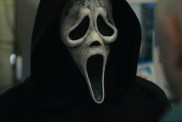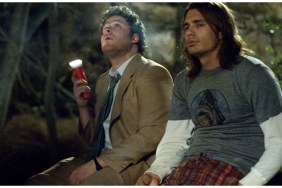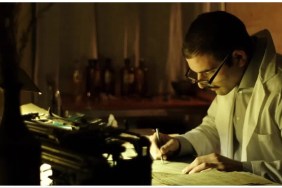Cast:
Julianne Moore as Doctor’s Wife
Mark Ruffalo as Doctor
Alice Braga as Woman with the Dark Glasses
Danny Glover as Man with the Black Eye Patch
Gael García Bernal as Bartender / King of Ward Three
Yusuke Iseya as First Blind Man
Don McKellar as Thief
Fabiana Guglielmetti as Mother of the Boy
Mitchell Nye as Boy
Jason Bermingham as Driver #1
Ciça Meirelles as Driver #2
Eduardo Semerjian as Concerned Pedestrian #1
Antônio Fragoso as Concerned Pedestrian #2
Joe Pingue as Taxi Driver
Susan Coyne as Receptionistx
Directed by Fernando Meirelles
Summary:
Some novels were never meant to be adapted into movies; apparently, this is one of them, going by the generally dull and horrid way it’s been executed.
Story:
A sudden infectious virus has created blindness in anyone who comes in contact with those afflicted. For an eye doctor (Mark Ruffalo) and his wife (Julianne Moore), the situation becomes serious when they’re locked in a gulag with other victims forced to fend for themselves, while hiding the fact that she is still able to see.
(Note: The following analysis does contain a number of general plot spoilers.)
Analysis:
Brazil’s Fernando Meirelles has created such good filmmaking karma for himself with his last two movies, “City of God” and “The Constant Gardener,” that some might assume he’s a filmmaker who could do no wrong, and that’s exactly the environment which makes it more shocking that his adaptation of José Saramago’s novel “Blindness” is so awful, almost to the point of being unwatchable at times. Much of that revolves around the blurry bleached-out look used by Meirelles and his longtime DP Cesar Charlone for much of the movie to try to drive home the importance of sight, but that’s only a minor annoyance in the poor execution of the only mildly clever premise.
It opens innocuously enough with a Japanese man on the highway suddenly losing his sight, putting a sudden halt to traffic. A good samaritan, played by screenwriter Don McKellar, stops to give the man a ride home, taking advantage of the confused man’s trusting nature to rob him. When the man’s wife comes home, she takes him to see the eye doctor (Mark Ruffalo) who can’t find anything wrong with him, but the next day, the doctor can no longer see either and soon, all of the doctor’s patients are losing their sight: a hooker who always wears sunglasses, played by Alice Braga, a man with a patch (Danny Glover) and a young boy, as the disease proves infectious, afflicting anyone who comes in contact with them except the doctor’s wife. With no solid answers or easy solutions available to the government, all of the infected are shepherded into an unmanned hospital ward to fend for themselves.
There’s no question it’s a vaguely interesting premise to think of everyone on the planet suddenly losing their sight, but in an effort to take this idea to the most logical extreme, the movie quickly turns ludicrous once the characters are shunted off to the hospital ward. You’ll probably have some idea where things are going, but once there, the movie turns into a bad acting workshop with dozens of actors stumbling around in their own filth acting blind. As much as it’s about them surviving on their own without eyesight, the eye doctor has a clear advantage in that his wife is the only who hasn’t lost her sight though she continues to pretend otherwise.
Deserted by the government to their fate, things start getting hairy as the food is running out, at which one point, one opportunistic prisoner in the adjoining Ward 3 (Gael Garcia Bernal) decides to take advantage of the situation. Soon, things have gotten horribly worse as the bad element start demanding sex from the women in exchange for food, and we’re subjected to the most horrendous gang-rape/orgy scene since maybe “A Clockwork Orange.” It’s one of those “please don’t go there” moments that turns what was essentially a bad movie into one so inexcusably horrid that it never fully recovers. It’s a scene that’s sure to anger women in the somewhat titillating way it’s handled as much as it angers anyone already frustrated by the handling of the material.
Overall, the film fails to deliver any sort of believable plausibility. It never makes any sense why the government might shut all these blind people away, not only without assistance, but surrounding them with armed security guards told to shoot anyone who tries to escape. Looking back at how horrifying the RAGE-infested denizens of Danny Boyle’s “28 Days Later” were, imagine the same kind of movie with a group of generally-sane people who can’t see fumbling around. Not quite as scary, is it? It’s never explained how this epidemic started, why it became so infectious, and why of all people, only Julianne Moore is able to retain her sight despite being surrounded by the infected for seemingly months at a time. In fact, we never really get any idea how much time passes that they’re all locked up.
The movie has been marketed like a post-apocalyptic thriller, as if this blindness is a global event, but for the most part, the body of the film remains within the ward to show how all the blind people are forced to survive. During this extended section, we only go outside once, for a brief montage showing what’s happening in the outside world with quick glimpses of a bus and a plane crashing.
All the bad acting aside, Moore and Ruffalo are generally decent compared to the cast around them, but their standout performances don’t make much of a difference since the writing is so weak, always going for very obvious plot developments. Maybe all the scenes of people fumbling around blind wouldn’t be so bad if Meirelles didn’t deliberately make the movie like complete and utter sh*t, shooting entire scenes with practically no lighting or over-saturating scenes with bright white, presumably done to throw the viewer off or force them to imagine what it must be like to lose one’s eyesight. Sure, we get it, but it takes away from any realism to go for such a stylish look.
Eventually, the main group does get out of the prison, and are shocked to “see” that the entire city has fallen to the blindness virus while they’ve been struggling on their own–they must have forgotten that earlier montage. This sudden chance of scenery gives Meirelles and his production designer a chance to show off their ability to clear streets of people and pile them high with garbage to show how the rest of the world has been affected by the loss of sight in its inhabitants.
The last act has the main group all living happily in a house together, having adjusted to their new life without sight and causing a loss in modesty that allows for a bit of blatant softcore porn that comes from out of left field in context of the movie we’ve been watching. If that weren’t bad enough, we’re then subjected to a number of ridiculous back-to-back twists worse than anything in M. Night Shyamalan’s “The Happening,” a movie that took a similar premise and failed just as miserably at delivering on it.
The Bottom Line:
This is a generally repulsive letdown from one of the 21st Century’s greatest filmmakers, so much so that one can only assume that “the blind leading the blind” best describes the decision to adapt this novel in such an abysmal manner.










